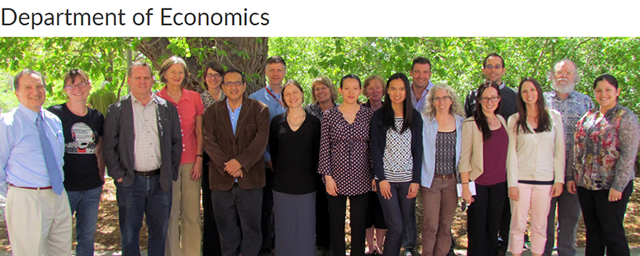
Economics ETDs
FRESHWATER CONSERVATION, DRINKING WATER QUALITY AND CLIMATE CHANGE ADAPTATION: A CASE STUDY ON NEPAL
Publication Date
Fall 8-1-2019
Abstract
Our world today faces a myriad of unprecedented environmental challenges that transcends spatial and temporal reach. These problems involve interconnected ecological and social systems operating on multiple scales and include issues like climate disruption, water stress, food security, biodiversity loss, over-population and species declines and extinctions.These issues are more acute in rapidly growing nations like Nepal, where environmental protection is often considered a luxury. Such environmentally unsound development practices will not only create an imbalance in the ecological and the social functioning and dynamics, but it also threatens the future development of the country itself. In this dissertation, I investigate three major environmental challenges in Nepal: problems with freshwater conservation, issues with drinking water quality and availability, and concerns with climate change adaptation and mitigation.
To approach these environmental challenges, chapter 2 employs a choice experiment method to assess the potential for a sustainable management of the Danda River system in Nepal. Using a Generalized Multinomial Logit model (GMNL) to account for households’ preference and scale heterogeneity, I find that respondents are willing to pay (WTP) about $17.06/year to improve the quality of the river water, and $13.46/year to introduce vegetation in theDanda riverbank. The results also suggest a presence of local spatial heterogeneity in the preference for the river ecosystem services. Households located in the central region in the urban town of Siddharthangar preferred the river ecosystem services to households located anywhere else. Further, I also find evidence for preference of local governance, with the households’ favoring a community-based management of the Danda river system. This finding highlights the need for policymakers to decentralize the management of local resources to communities to enhance interest in conservation of common pool resource like the Danda river system.
In my third chapter, I investigate water averting behavior by placing a particular emphasis on the divergence between a household’s perception of their water quality and the objective water quality level. The findings indicate that the gap between perception and reality indeed plays a role in a household’s decision to adopt water treatment measures. Households with minimal divergence between subjective and objective water quality were more likely to engage in water averting behaviors than households otherwise. In my fourth chapter, I employ a hedonic model to investigate the impact of climate change on agricultural productivity in Nepal. Findings suggest that while the Nepalese farmlands are sensitive to increases in temperature and precipitation, the effects vary depending on whether the farmlands were irrigated or not.
Degree Name
Economics
Level of Degree
Doctoral
Department Name
Department of Economics
First Committee Member (Chair)
Alok K. Bohara
Second Committee Member
Jennifer A. Thacher
Third Committee Member
Jingjing Wang
Fourth Committee Member
Yan Lin
Document Type
Dissertation
Recommended Citation
Kunwar, Samrat B.. "FRESHWATER CONSERVATION, DRINKING WATER QUALITY AND CLIMATE CHANGE ADAPTATION: A CASE STUDY ON NEPAL." (2019). https://digitalrepository.unm.edu/econ_etds/103


